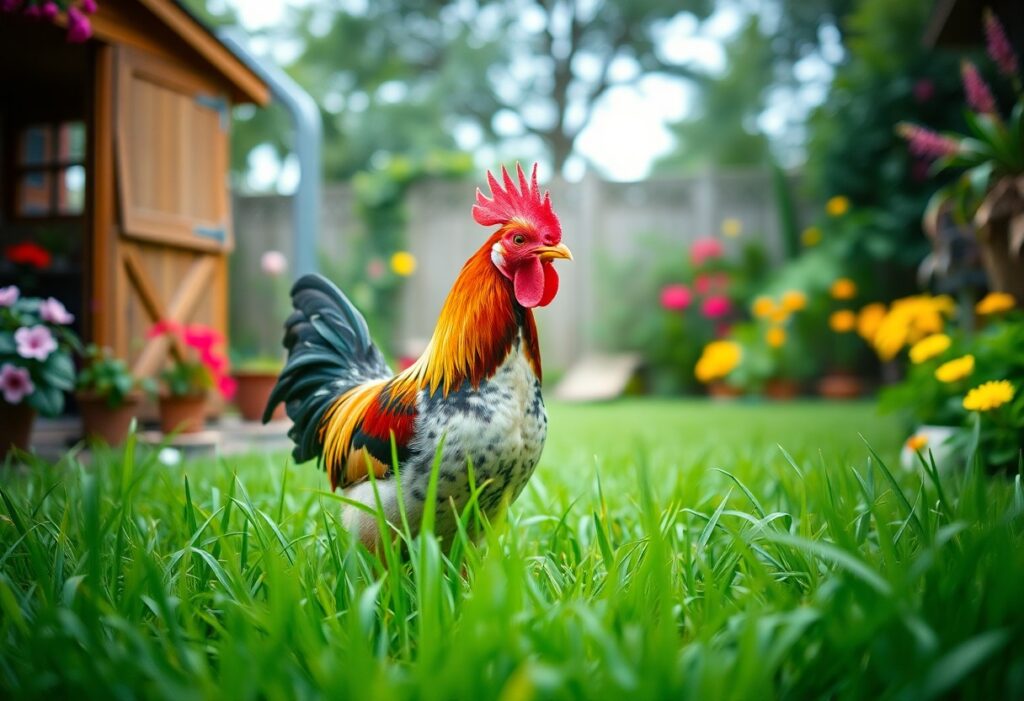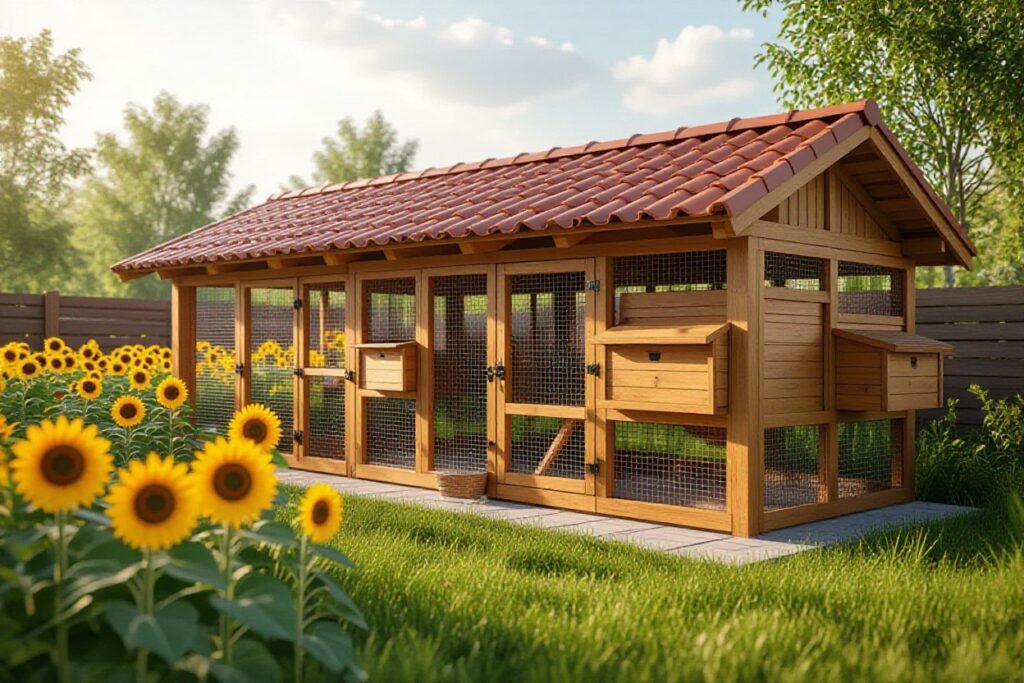Many backyard poultry owners seek to provide the best living conditions for their roosters. Creating a healthy environment is important not only for their well-being but also for optimal egg production and flock harmony. You must consider factors such as adequate space, clean housing, and proper nutrition to ensure your rooster thrives. This guide will equip you with valuable tips to foster a safe and healthy habitat for your feathered friend, promoting a fulfilling and productive life in your backyard.
Key Takeaways:
- Provide adequate space and shelter to ensure your rooster feels safe and comfortable, reducing stress and aggression.
- Include a balanced diet and access to clean water, promoting overall health and vitality for your backyard poultry.
- Integrate socialization opportunities with hens and regular handling to foster positive behavior and strengthen bonds.
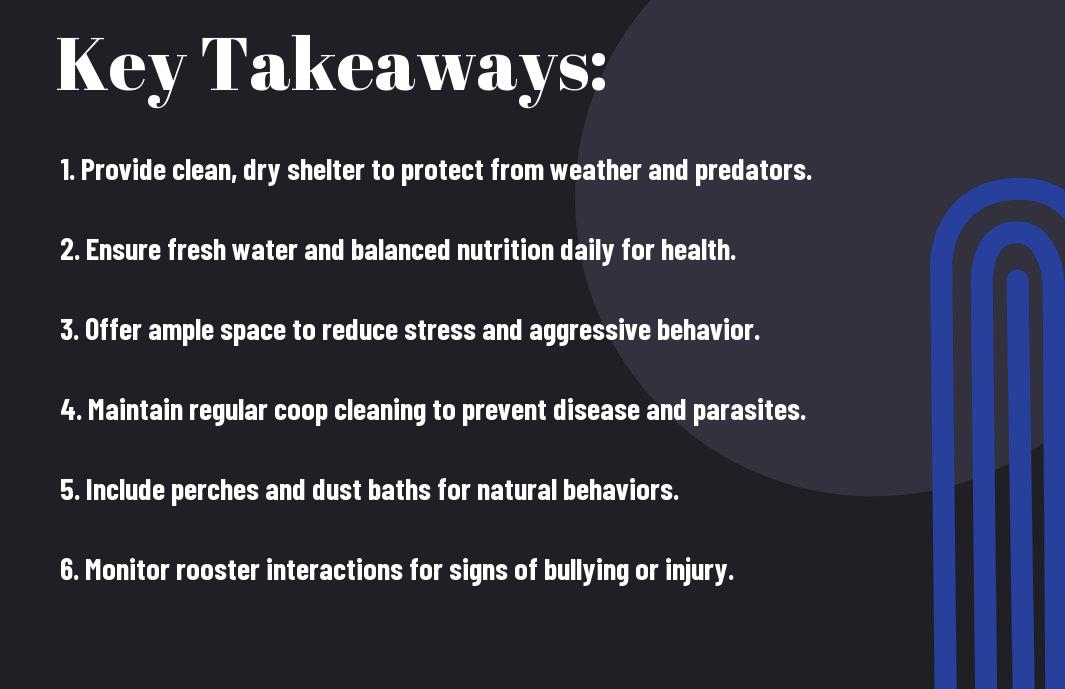
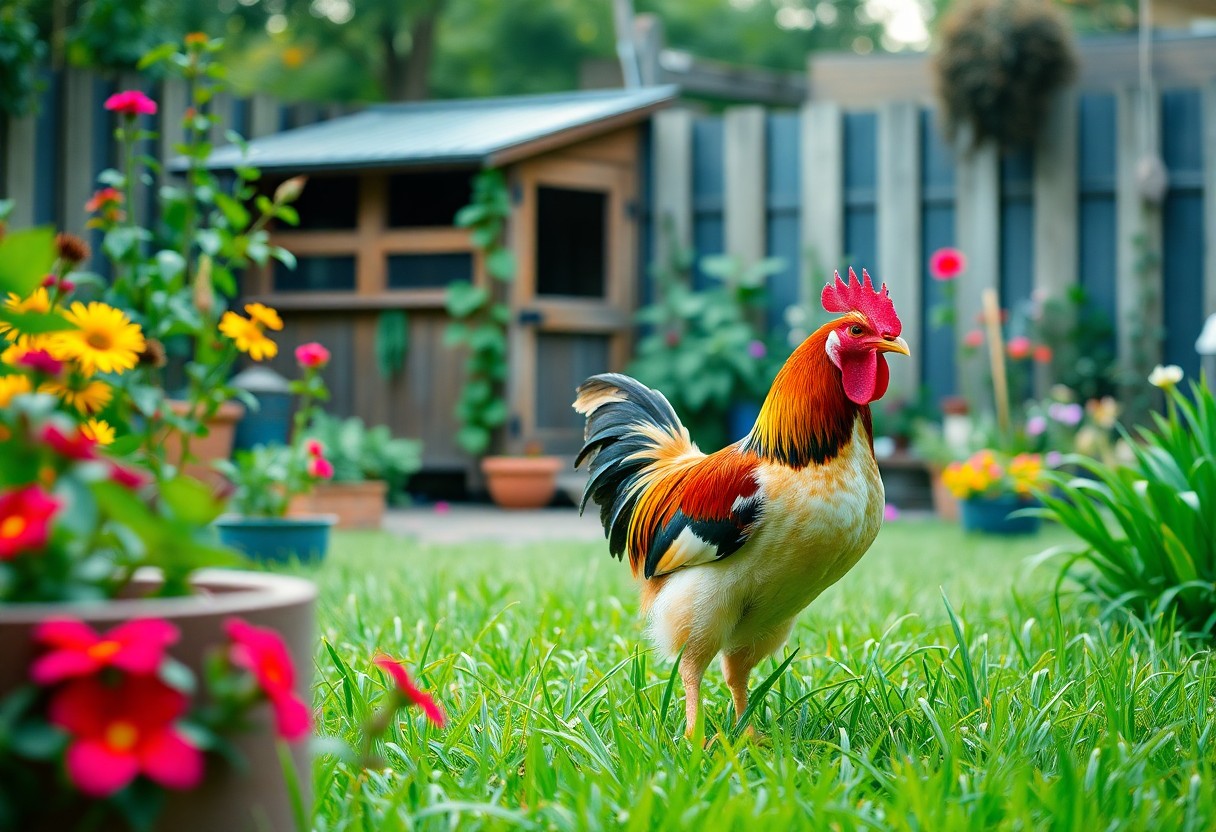
Understanding Rooster Behavior
As a backyard poultry owner, it’s vital to recognize the unique behaviors of roosters. They are not just protectorates for your flock; their social dynamics and instincts play significant roles in their health and well-being. By understanding these behaviors, you can create a more harmonious environment for your entire flock.
Social Structure and Hierarchy
Understanding the social structure among your flock is imperative for maintaining peace. Roosters are natural leaders, establishing a hierarchy that affects all chickens. Recognizing this order allows you to reduce stress and conflicts within your birds, ensuring a healthier living environment.
Pecking Order Dynamics
Social interactions within your flock revolve around a defined pecking order. This hierarchy not only influences daily activities but also affects breeding, feeding, and social behavior among your chickens.
Due to the inherent pecking order dynamics, every rooster plays a specific role that contributes to the overall harmony of your flock. This system defines dominance and submissiveness, impacting feeding rights and mating opportunities. Fighting can emerge if a rooster challenges another’s position, causing potential injuries. Therefore, it’s imperative to monitor these interactions. Encouraging a balanced environment can lead to a more peaceful and healthy flock, where birds can coexist with minimal stress and competition.
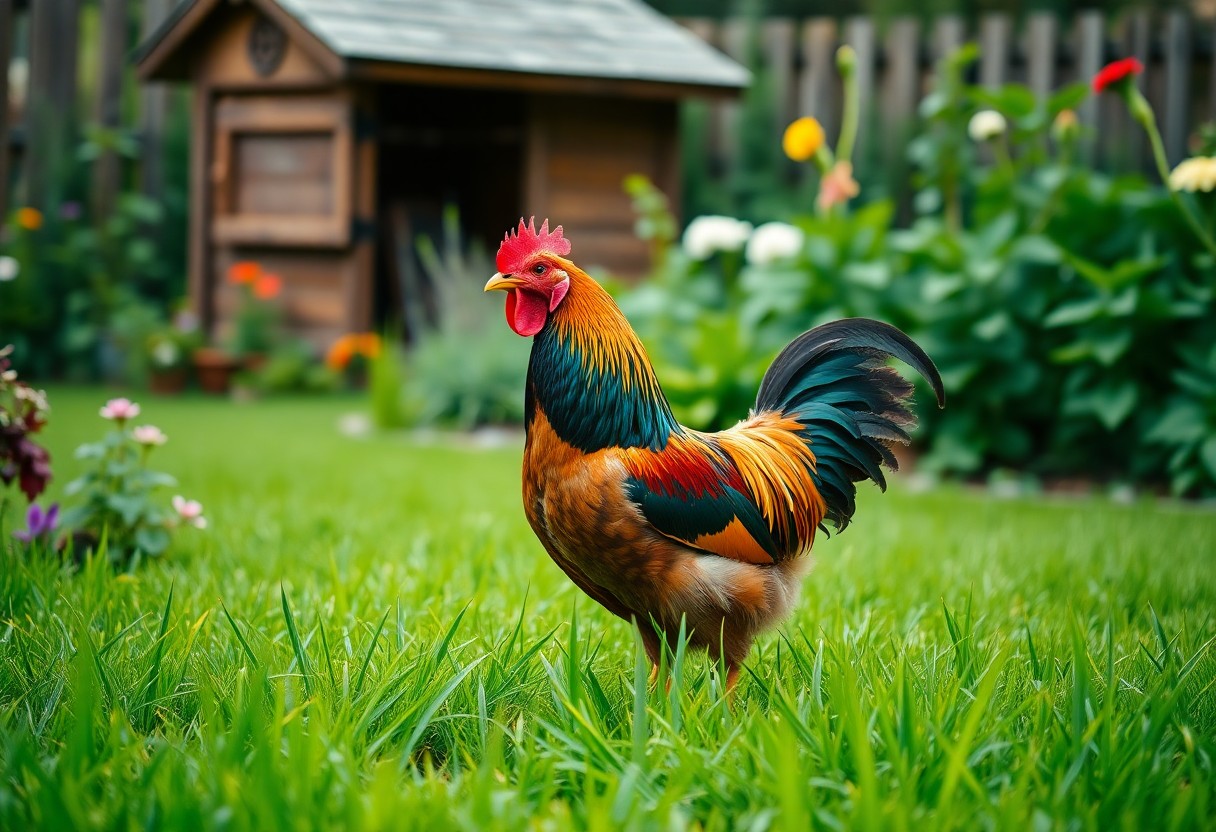
Setting Up the Ideal Habitat
Assuming you want to provide your rooster with the best living conditions, it’s necessary to create an environment that simulates their natural habitat. This includes a spacious and secure coop, access to outdoor space, and a comfortable living area. Consider your rooster’s social needs, as well as their health and safety, to promote the best quality of life.
Coop Design and Space Requirements
The design of your coop should ensure ample space for your rooster to roam freely and exhibit natural behaviors. A general guideline is to allocate at least 4 square feet per rooster inside the coop, along with 10 square feet of outdoor space for them to explore.
Ventilation and Temperature Control
At the heart of a healthy coop is proper ventilation and temperature control. Adequate airflow helps to reduce humidity and manages harmful ammonia buildup, while maintaining a comfortable temperature range is vital for your rooster’s well-being.
Essential Ventilation and Temperature Considerations
| Factor | Importance |
|---|---|
| Good Ventilation | Reduces moisture and ammonia |
| Temperature Control | Ensures comfort and health |
| Draft-Free Coop | Prevents stress and illness |
Habitat conditions greatly affect your rooster’s health. In the summer, ensure your coop is well-ventilated to keep temperatures down, while during winter, insulate appropriately to maintain heat. Utilize windows for airflow, but position them to avoid direct drafts on your rooster. Ensure that ventilation systems do not create uncomfortable drafts, keeping your rooster safe and healthy year-round.
Temperature Management Tips
| Season | Management Tip |
|---|---|
| Summer | Provide shade and keep water fresh |
| Winter | Use insulated materials and heat lamps |
Nutrition for Healthier Roosters
Once again, providing a balanced diet for your rooster is key to ensuring his overall health and vitality. Adequate nutrition supports strong immune systems, promotes reproductive health, and can even enhance your rooster’s plumage. Focus on offering a variety of high-quality feeds, grains, and natural supplements to give your rooster the best possible dietary foundation.
Balanced Diet Essentials
One of the most important aspects of your rooster’s nutrition is a balanced diet that includes grains, proteins, vitamins, and minerals. Opt for a quality commercial poultry feed formulated specifically for roosters, ensuring it meets their unique dietary needs. Supplement this with fresh fruits, vegetables, and grains to provide important nutrients that enhance their overall health.
Supplements and Treats
Supplements can greatly enhance your rooster’s diet and overall well-being.
To ensure your rooster stays healthy and vibrant, consider adding vitamin and mineral supplements to his feed, especially if he is free-range or receives limited commercial feed. Natural treats like mealworms, leafy greens, and seeds can also support his nutritional needs while adding variety to his diet. However, be cautious not to overfeed these treats, as they can lead to digestive issues or obesity. Prioritize treats that provide important nutrients and maintain the right balance to promote health and vitality.
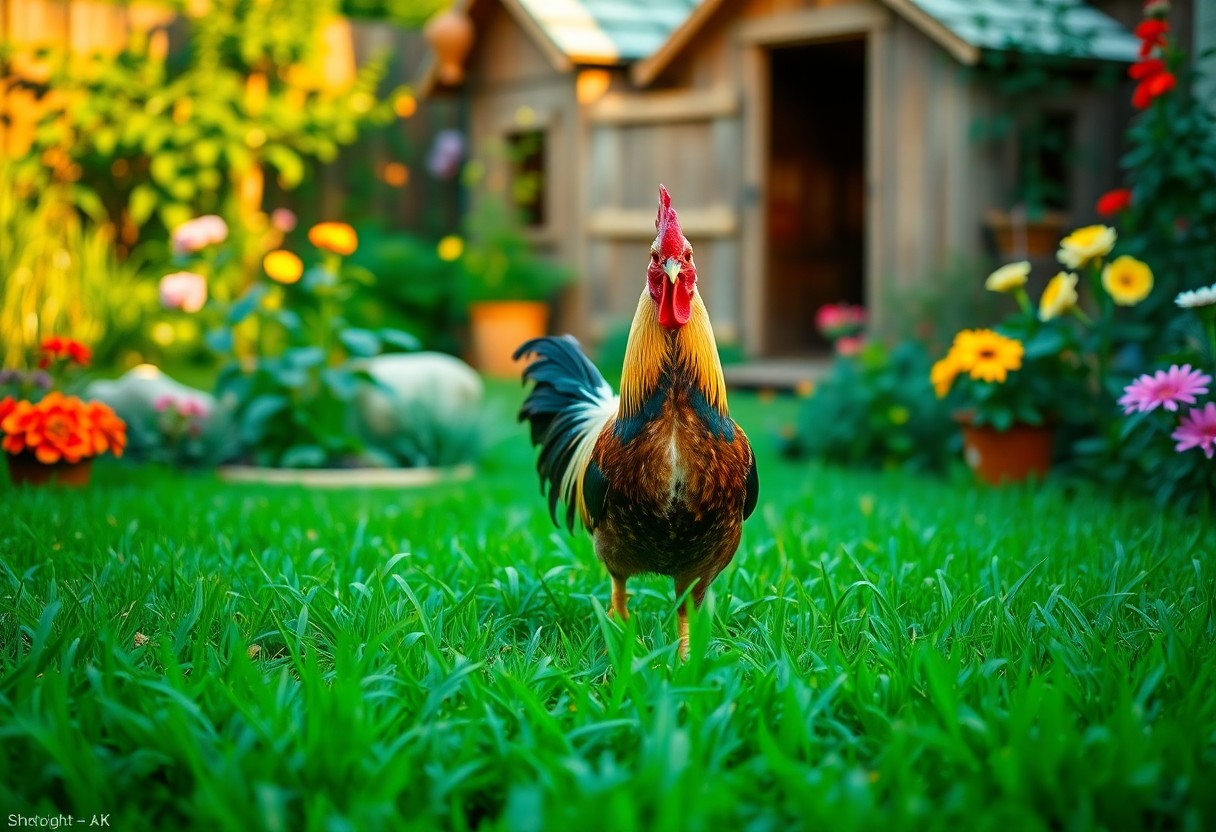
Ensuring Cleanliness and Hygiene
Not maintaining cleanliness can lead to serious health issues for your rooster. A clean environment not only promotes good health but also enhances the overall well-being of your poultry. Regularly removing waste and soiled bedding will help prevent bacterial growth and reduce the likelihood of infestations. A vigilant hygiene routine will keep your rooster thriving and happy, making your backyard a healthy space for poultry.
Regular Cleaning Schedules
Any successful chicken owner should establish a regular cleaning schedule to maintain a hygienic living environment for your rooster. This routine should include daily checks for waste, weekly spot cleaning, and thorough deep cleaning every month. By sticking to this schedule, you will minimize harmful bacteria and parasites, thus promoting the health of your poultry.
Pest Control Measures
Beside cleaning, implementing effective pest control measures is vital for your rooster’s health. You should regularly inspect your coop and yard for pests such as mites, lice, and rodents, which can negatively impact your bird’s well-being. Promptly addressing infestations will minimize their effects and help maintain a thriving flock.
Schedules should be in place for comprehensive pest control. Introduce natural deterrents, like diatomaceous earth, to combat parasites without harming your rooster. Ensure your coop has proper ventilation and is free from dampness to discourage pests. Regularly check corners and hidden areas, as rodents can pose a significant threat to your poultry’s food supply and safety. Creating a pest-free environment is fundamental for protecting your flock from diseases and ensuring their long-term health.
Health Monitoring and Veterinary Care
After introducing roosters to your backyard, it’s necessary to implement a consistent health monitoring routine. Regular checks for physical well-being, along with scheduled veterinary visits, will ensure that your rooster remains healthy and vibrant. Watch for signs of illness, as early intervention can significantly enhance recovery and minimize the spread of diseases among your flock.
Recognizing Common Health Issues
Against the backdrop of various common health issues, you should familiarize yourself with symptoms such as lethargy, abnormal droppings, and appetite changes. These warning signs may indicate conditions like respiratory infections or parasites, and addressing them promptly will help maintain a thriving environment for your rooster.
Vaccinations and Preventative Care
At the forefront of maintaining your rooster’s health is a solid vaccination and preventative care plan. This approach includes immunizations against prevalent diseases like Marek’s disease and , as well as regular fecal tests to check for internal parasites.
It is important to establish a comprehensive vaccination schedule tailored to your region’s risks. Consult your veterinarian to initiate an immunization plan for your flock, and take proactive steps like providing clean water and a balanced diet. By ensuring your rooster is protected, you can prevent serious health complications and support his overall well-being, leading to a positive and flourishing backyard poultry experience.
Social Interaction and Enrichment
Your rooster thrives on social interaction and mental stimulation. Creating an environment where they can express natural behaviors is necessary for their well-being. Regular interaction with you and other birds helps prevent loneliness, promotes healthy social behaviors, and encourages a happier disposition. Enrichment activities, such as foraging and play, enhance their quality of life and reduce stress, ultimately paving the way for a more vibrant and active rooster.
Providing Companionship
By ensuring your rooster has companions, you help fulfill their social needs. Roosters are naturally inclined to form bonds, so keeping them with hens or even other roosters can enhance their quality of life. It’s best to introduce new flock members gradually, allowing for a smooth transition and the establishment of a stable pecking order.
Toys and Foraging Opportunities
Behind providing adequate social interaction, introducing toys and foraging opportunities can significantly enhance your rooster’s environment. By incorporating items such as hanging greens, mirrors, or even simple balls, you stimulate their curiosity and playful instincts. This not only encourages activity but also promotes physical health, as your rooster will engage in natural foraging behaviors that keep them fit and mentally sharp.
Indeed, integrating enrichment toys and various foraging opportunities into your flock’s routine has proven benefits for a rooster’s overall wellbeing. Consider scattering grains, seeds, or greens in different areas of their space to motivate your rooster to explore and forage. Toys that mimic their natural behaviors, such as peckable items or distraction devices, can prevent boredom and reduce undesirable behaviors that arise from inactivity. A dynamic environment, rich in stimulation, not only keeps your rooster entertained but also encourages a flourishing, vibrant personality.
Final Words
Ultimately, providing a healthy environment for your rooster involves attention to proper housing, nutrition, and social interactions. By ensuring that your space is clean, safe, and enriching, you support not only your rooster’s well-being but also enhance the joy of owning backyard poultry. Stay informed about their specific needs and behaviors, and you’ll foster a thriving, happy flock that enjoys a balanced lifestyle. Your commitment to their health will reflect in their vitality and the overall harmony of your backyard.
FAQ
Q: What are the imperative components of a healthy living environment for my rooster?
A: To create a healthy environment for your rooster, consider the following components: adequate space, clean bedding, proper ventilation, and protection from predators. Each rooster requires enough space to move freely; a minimum of 4 square feet per bird in the coop is recommended. Use straw or wood shavings for bedding and change it regularly to prevent buildup of waste. Ensure the coop has good ventilation to maintain airflow and reduce humidity. Lastly, provide secure housing to protect your rooster from potential predators like raccoons or dogs.
Q: How often should I clean my rooster’s living area, and why is it important?
A: Cleaning your rooster’s living area should be done at least once a week. This helps to prevent the accumulation of waste, which can lead to unhealthy living conditions and potential diseases. Regular cleaning also reduces odors and makes it easier to spot any health issues your rooster may be experiencing. Additionally, keeping the area clean promotes a more comfortable environment, encouraging your rooster to maintain good health and well-being.
Q: What type of diet should I provide to ensure my rooster stays healthy in his environment?
A: A balanced diet is vital for your rooster’s health. He should receive a high-quality commercial poultry feed formulated for his age and size, which typically includes grains, proteins, and imperative vitamins and minerals. Supplement this feed with fresh vegetables, fruits, and occasional treats like mealworms or oats. Access to clean, fresh water is also imperative at all times. A proper diet promotes strong immune function, overall vitality, and enhances reproduction in roosters.
